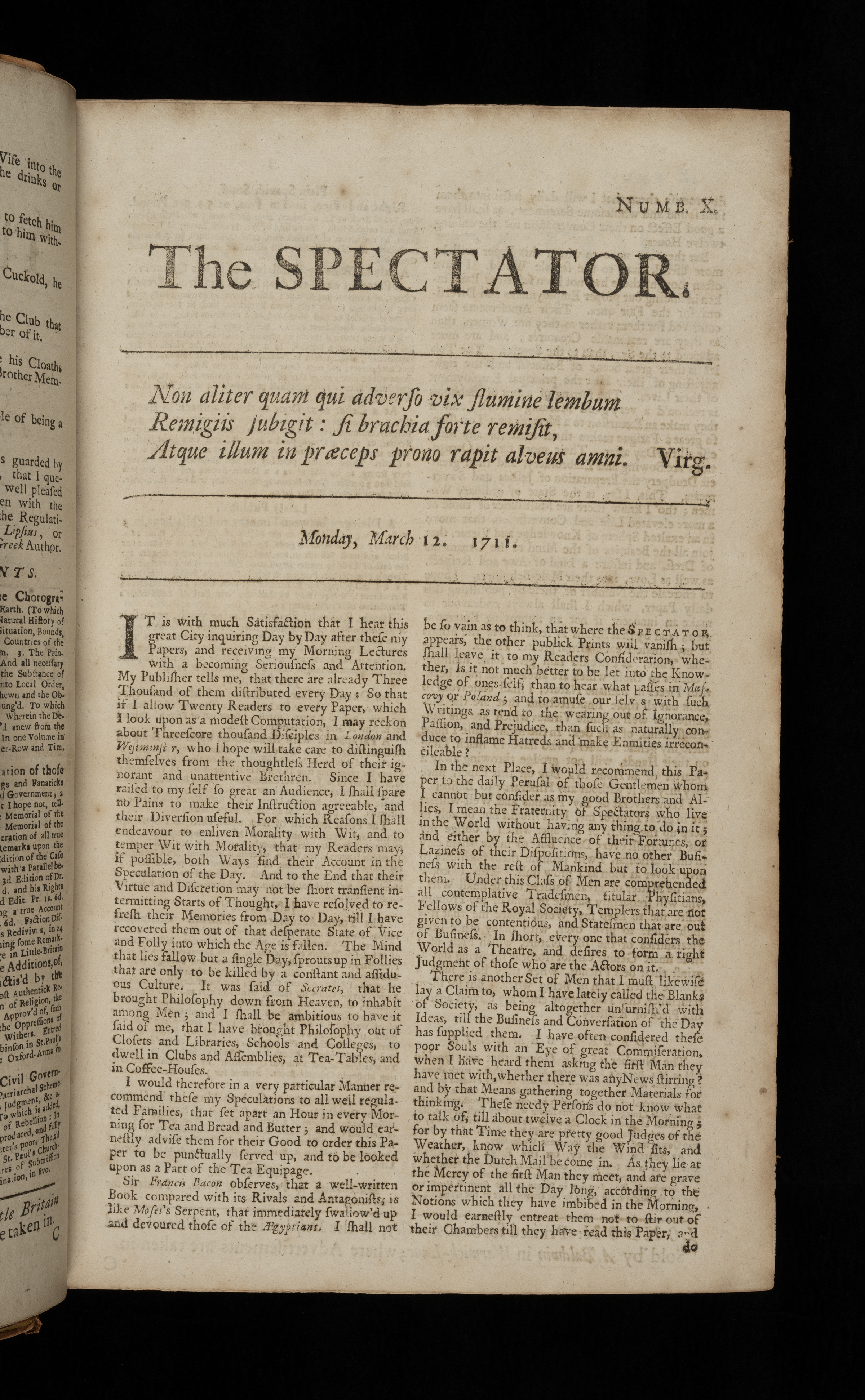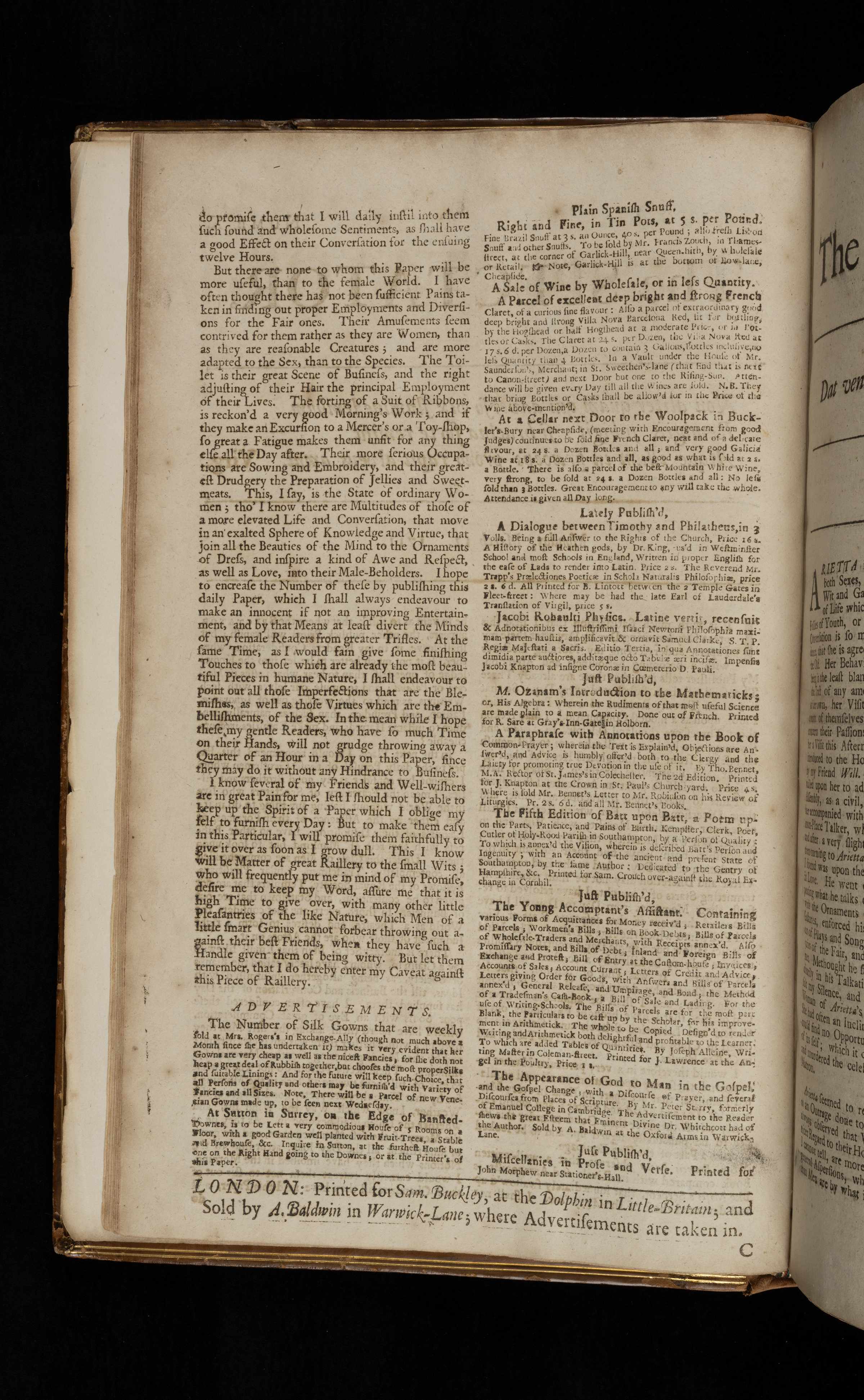The Spectator, Issue 10, Monday, March 12, 1711
By
Joseph Addison
Non aliter quam qui adverso vix flumine lembum Remegiis subigit: si brachia forte remisit, Atque illum in praeceps prono rapit alveus amni. Virgvirgil virgil"It is just like when a rower is trying to pull his boat upstream with his oars; as soon as he relaxes, the current pulls him downstream." From the first of the Georgics by the Roman poet Virgil
Monday, March 12, 1711.
It is with much Satisfaction that I hear this great CitycitycityLondon inquiring Day by Day after these my Papers, and receiving my Morning Lectures with a becoming Seriousness and Attention. My Publisher tells me, that there are already Three Thousand of them distributed every Day: So that if I allow Twenty Readers to every Paper, which I look upon as a modest Computation, I may reckon about Threescore thousandthreescorethreescoreScore equals twenty; thus threescore thousand would be sixty thousand readers. Papers would be sold to coffeehouses, where, Addison is claiming, an average of twenty readers would read each copy in the course of a day. Addison is probably being accurate in the number of copies being printed, and 3000 was a large print run at the time, especially for a new journal. The figure of twenty readers for each issue is probably a best guess, perhaps a very optimistic one. Disciples in London and Westminster, who I hope will take care to distinguish themselves from the thoughtless Herd of their ignorant and unattentive Brethren. Since I have raised to myself so great an Audience, I shall spare no Pains to make their Instruction agreeable, and their Diversion useful. For which Reasons I shall endeavour to enliven Morality with Wit, and to temper Wit with Morality, that my Readers may, if possible, both Ways find their account in the Speculation of the Day. And to the End that their Virtue and Discretion may not be short transient intermitting Starts of Thought, I have resolved to refresh their Memories from Day to Day, till I have recovered them out of that desperate State of Vice and Folly, into which the Age is fallen. The Mind that lies fallowfallowfallowbarren or uncultivated but a single Day, sprouts up in Follies that are only to be killed by a constant and assiduousassiduousassiduousdiligent Culture. It was said of Socrates, that he brought Philosophy down from Heaven, to inhabit among Men; and I shall be ambitious to have it said of me, that I have brought Philosophy out of Closets and Libraries, Schools and Colleges, to dwell in Clubs and Assemblies, at Tea-tables, and in Coffee houses.
I would therefore in a very particular Manner recommend these my Speculations to all well-regulated Families, that set apart an Hour in every Morning for Tea and Bread and Butter; and would earnestly advise them for their Good to order this Paper to be punctually served up, and to be looked upon as a Part of the Tea Equipageequipageequipagethat is, part of the equipment for serving tea.
Sir Francis Bacon observes, that a well-written Book, compared with its Rivals and Antagonists, is like Moses's Serpent, that immediately swallow'd up and devoured those of the Egyptians. I shall not be so vain as to think, that where the SPECTATOR appears, the other publick Prints will vanish; but shall leave it to my Readers Consideration, whether, Is it not much better to be let into the Knowledge of ones-self, than to hear what passes in MuscovymuscovymuscovyBefore the Russian empire was founded by Peter the Great in 1721, the Russian state was often referred to as "Muscovy" as its central city was Moscow. or Poland; and to amuse our selves with such Writings as tend to the wearing out of Ignorance; Passion, and Prejudice, than such as naturally conduce to inflame Hatreds, and make Enmitiesenmitiesenmitiesill will irreconcileable.
In the next Place, I would recommend this Paper to the daily Perusal of those Gentlemen whom I cannot but consider as my good Brothers and Allies, I mean the Fraternity of Spectators who live in the World without having any thing to do in it; and either by the Affluence of their Fortunes, or Laziness of their Dispositions, have no other Business with the rest of Mankind but to look upon them. Under this Class of Men are comprehended all contemplative Tradesmen, titular Physicians, Fellows of the Royal SocietyroyalsocietyroyalsocietyA British learned society, founded in 1660, that is the oldest national scientific institution in the world. The society is still around today., TemplerstemplerstemplersLaw students at the Middle Temple, one of the Inns of Court where lawyers were trained. The stereotype of law students in this period was that they were loafers without a lot to do, which may or may not have been merited. that are not given to be contentious, and Statesmen that are out of business. In short, every one that considers the World as a Theatre, and desires to form a right Judgment of those who are the Actors on it.
There is another Set of Men that I must likewise lay a Claim to, whom I have lately called the Blanks of Society, as being altogether unfurnish'd with Ideas, till the Business and Conversation of the Day has supplied them. I have often considered these poor Souls with an Eye of great Commiserationcommiserationcommiserationsympathy, when I have heard them asking the first Man they have met with, whether there was any News stirring? and by that Means gathering together Materials for thinking. These needy Persons do not know what to talk of; till about twelve a Clock in the Morning; for by that Time they are pretty good Judges of the Weather, know which Way the Wind sits, and whether the Dutch Maildutchmaildutchmailmail from the Netherlands, carrying key financial information from the markets in that country be come in. As they lie at the Mercy of the first Man they meet, and are grave or impertinentimpertinentimpertinentirrelevant or disconnected. all the Day long, according to the Notions which they have imbibedimbibedimbibedabsorbed or taken in, probably with a literal sense of drinking, since he is thinking of men who hang out all day in coffee-houses in the Morning, I would earnestly entreatentreatentreatrequest or ask, with a sense of urgency them not to stir out of their Chambers till they have read this Paper, and

